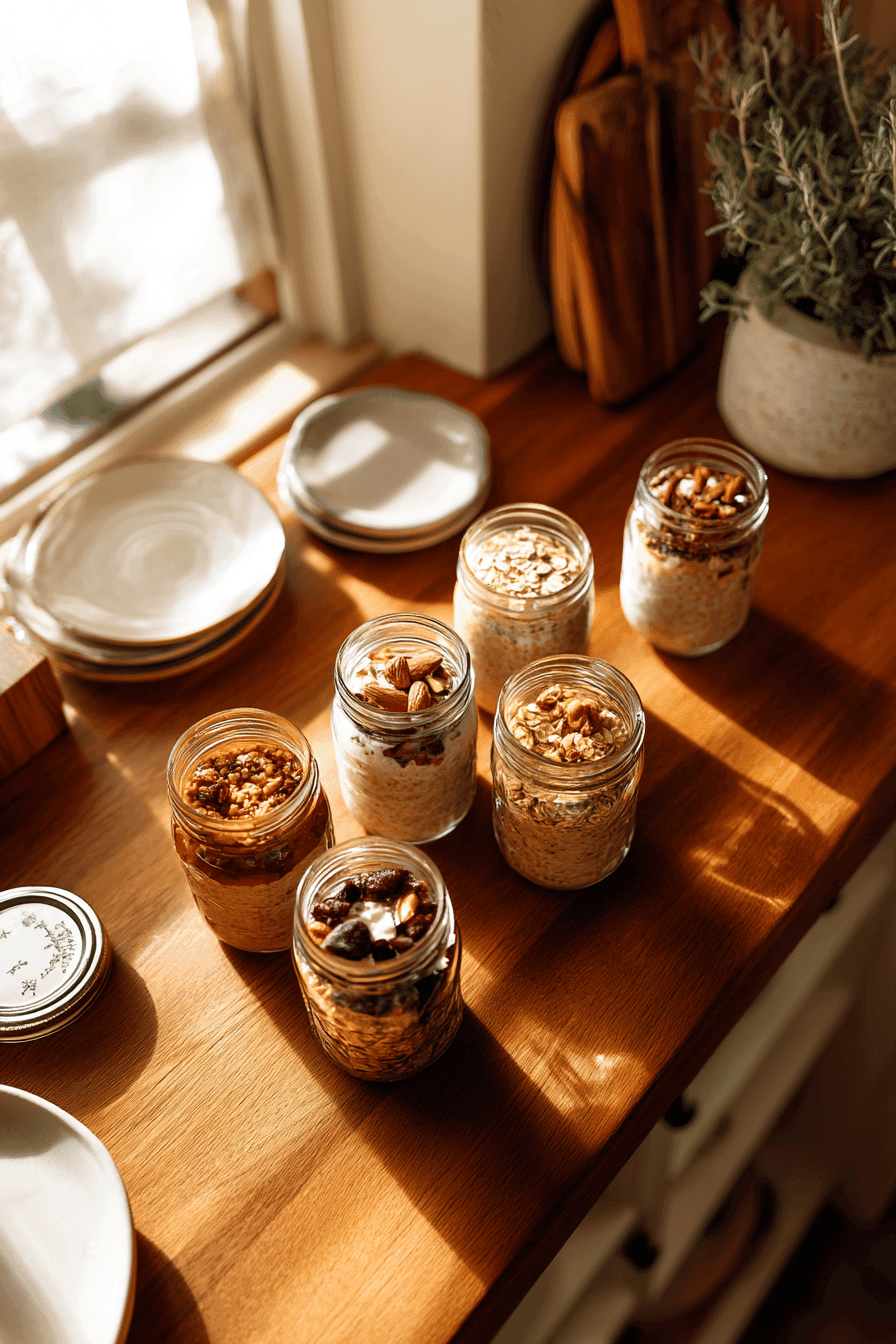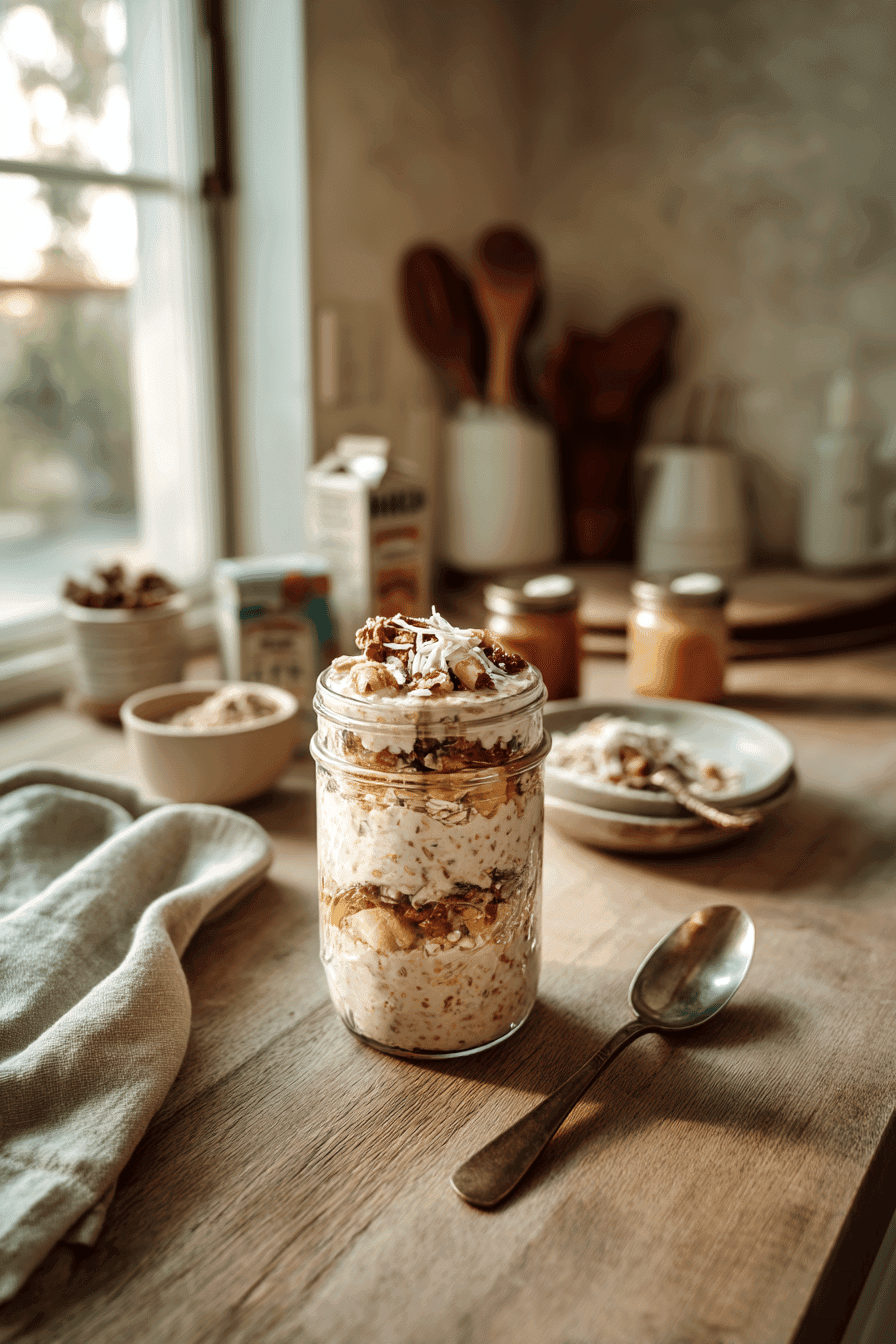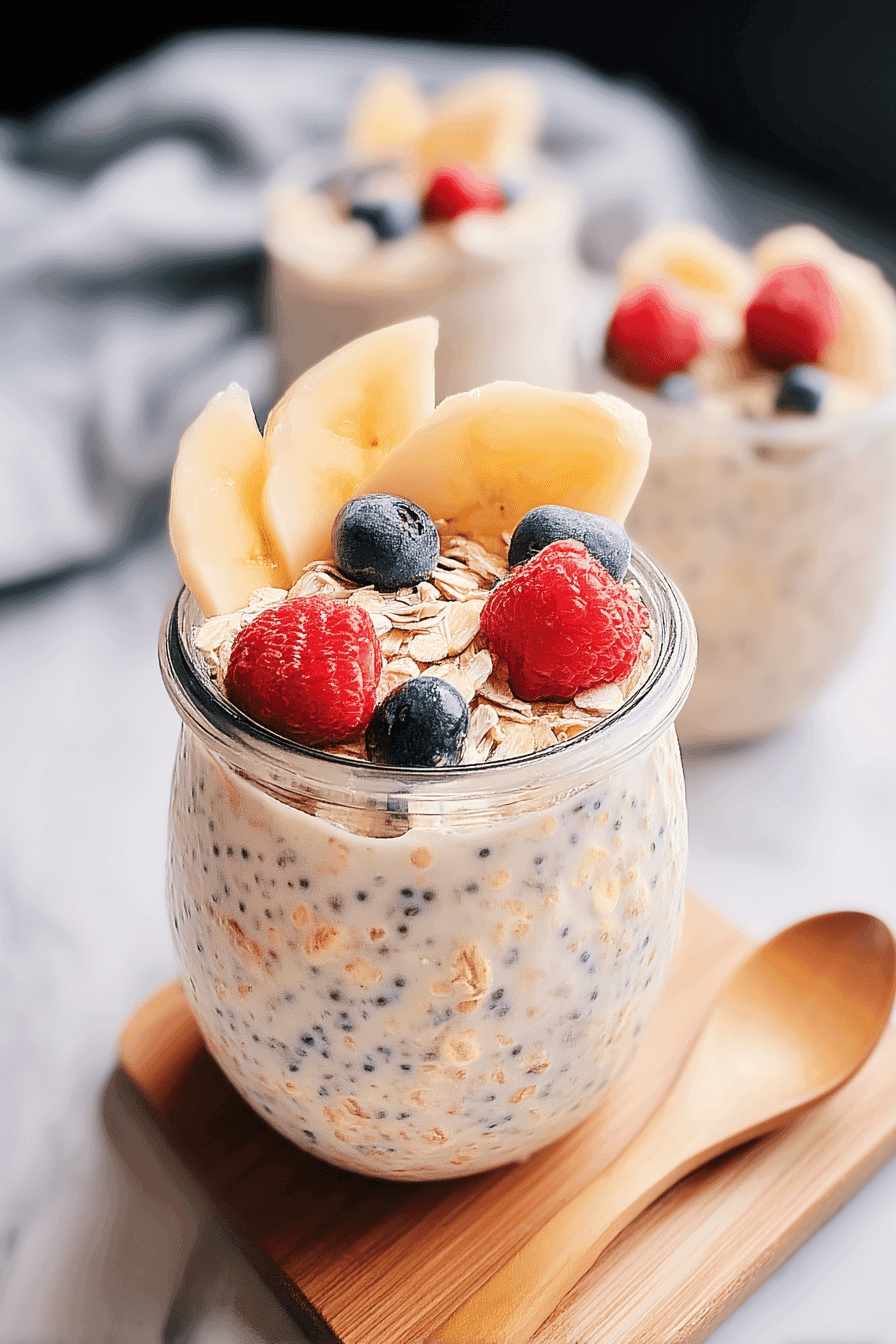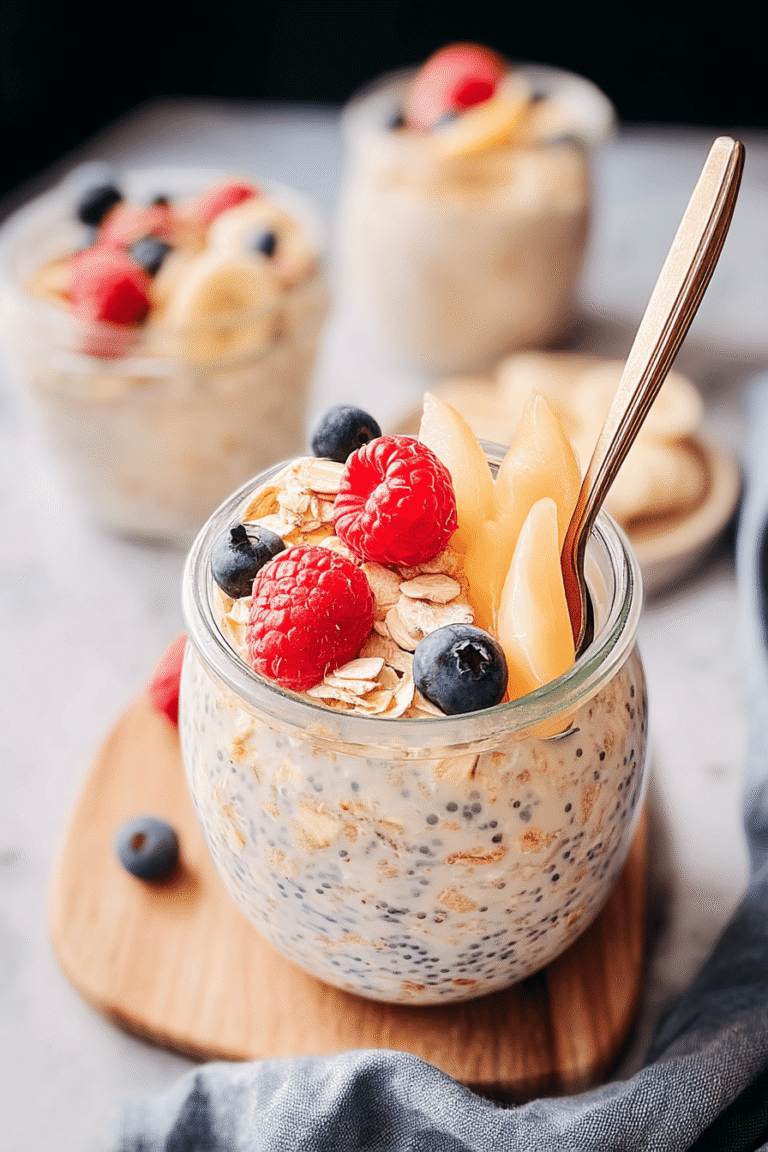Benefits and Advantages of overnight oats
This overnight oats recipe offers numerous benefits that make it a terrific breakfast option. Its simple preparation process allows you to mix ingredients the night before, saving precious time in the morning. Packed with fiber, vitamins, and minerals, overnight oats support healthy digestion and provide sustained energy throughout the day. Soaking the oats enhances flavor absorption and creates a creamy texture without any cooking involved. Moreover, this breakfast is versatile, easily accommodating various dietary preferences and tastes, making it an ideal, healthy choice for busy lifestyles.
Jump to:
- Benefits and Advantages of overnight oats
- Essential Ingredients for overnight oats
- Dietary Substitutions to Customize Your overnight oats
- How to Prepare the Perfect overnight oats: Step-by-Step Guide
- Mastering overnight oats: Advanced Tips and Variations
- How to Store overnight oats: Best Practices
- Nutritional Value of overnight oats
- FAQs: Frequently Asked Questions About overnight oats
- What are overnight oats and why are they a healthy breakfast choice?
- How do I make overnight oats creamy and avoid them being too thick or hard?
- Can I eat overnight oats warm, and how should I reheat them safely?
- What toppings should I add and when is the best time to add them to overnight oats?
- Can I prepare overnight oats in bulk and how should I store them for freshness?
- Simple and Nutritious Overnight Oats Recipe for a Quick, Healthy Breakfast
- Ingredients
- Instructions
- Last Step:
- Notes
- Nutrition
- Did you make this recipe?
Essential Ingredients for overnight oats
- ½ cup old-fashioned rolled oats (about 40–45 grams)
- ½ cup milk or milk alternative (120 ml; unsweetened almond milk recommended for dairy-free)
- ¼ cup Greek yogurt or plant-based yogurt (60 grams; optional for creaminess and protein boost)
- 1–2 teaspoons honey, maple syrup, or preferred sweetener
- 1 teaspoon vanilla extract
- Pinch of sea salt
- 1 tablespoon chia seeds (optional, for texture and extra fiber)
- ½ teaspoon ground cinnamon or other spices (optional)
Additional toppings such as fresh fruit, nuts, seeds, nut butters, or protein powders can be added just before serving to enhance flavor and nutrition. These ingredients work harmoniously to achieve balanced nutrition, creamy texture, and delightful taste.

Dietary Substitutions to Customize Your overnight oats
Overnight oats can easily be tailored for different dietary needs:
- Vegan: Use plant-based milks like coconut or soy milk and substitute Greek yogurt with plant-based yogurt.
- Gluten-Free: Use certified gluten-free rolled oats to prevent cross-contamination.
- Low-Carb: Reduce or omit high-sugar fruits and sweeteners; substitute oats with low-carb grains like quinoa flakes.
- Higher Protein: Add nut butters, protein powders, or more yogurt for an extra protein boost.
- Dairy-Free: Swap dairy milk and yogurt for unsweetened nut or oat milks and dairy-free yogurts.
These substitutions maintain the classic creamy texture while addressing nutritional and allergen concerns, keeping the breakfast balanced and delicious.
How to Prepare the Perfect overnight oats: Step-by-Step Guide
- Gather Ingredients: Prepare rolled oats, your choice of milk or plant-based alternative, chia seeds, sweetener, vanilla extract, cinnamon, and yogurt if using.
- Combine Oats and Liquid: In a jar or bowl, mix ½ cup rolled oats with ½ cup milk (or alternative) to ensure proper soaking.
- Add Enhancers: Stir in ¼ cup yogurt, 1 tablespoon chia seeds, sweetener, vanilla extract, cinnamon, and a pinch of sea salt.
- Mix Thoroughly: Stir the mixture well to distribute ingredients evenly for consistent texture.
- Refrigerate: Cover and refrigerate the mixture for at least 6 hours or overnight to allow oats to soften and flavors to meld.
- Final Touches: In the morning, stir the oats, add more milk if needed to adjust consistency, and top with fresh fruit, nuts, or seeds as desired.
This straightforward process makes it easy to customize your overnight oats recipe for various tastes or nutritional needs while guaranteeing a creamy, ready-to-eat breakfast every day.

Mastering overnight oats: Advanced Tips and Variations
To take your overnight oats to the next level, explore texture and flavor combinations that suit your preferences. Adding shredded coconut or toasted nuts introduces crunchy, tropical notes that contrast nicely with the creamy oats. For a richer texture, stir in Greek yogurt or mashed bananas before soaking, which adds creaminess and natural sweetness.
Try blending in warm spices such as cinnamon, nutmeg, or vanilla extract to subtly enhance the taste without overpowering the natural flavors. Creating layered parfaits by alternating oats with different fruit purees or compotes offers visual appeal and varied taste in each spoonful. For an added protein boost, mix in plant-based or Greek yogurt protein powders.
Experimenting with the soaking liquid by using flavored milks, such as vanilla almond milk or chai-infused teas, can give unique twists and keep breakfast exciting. These variations maintain the nutritional benefits of overnight oats while enabling enjoyable personalization.
How to Store overnight oats: Best Practices
Store your overnight oats in airtight containers, preferably glass jars or BPA-free plastic containers, to keep freshness intact and prevent contamination. Refrigerated overnight oats typically last 3 to 5 days, making them ideal for batch meal prepping. For longer storage, you can freeze portions; however, it is best to freeze without adding fresh fruit toppings to avoid texture changes.
When ready to eat frozen oats, thaw them overnight in the refrigerator and stir well before serving. While overnight oats are usually enjoyed cold, you can gently warm them in the microwave if preferred, taking care to heat them gradually to avoid overheating or drying out.
Keep toppings like nuts, seeds, and delicate fruits separate until serving to preserve crunch and freshness.
Nutritional Value of overnight oats
| Nutrient | Typical Amount per Serving | Health Benefit |
|---|---|---|
| Calories | 270–320 kcal | Provides sustained energy for morning activities |
| Protein | 8–11 g | Supports muscle maintenance and satiety |
| Carbohydrates | 38–50 g | Complex carbs offer steady energy release |
| Fat | 8–10 g | Contains healthy fats important for brain health |
| Fiber | 5–8 g | Aids digestion and promotes fullness |
This balance of nutrients makes overnight oats a powerful, nutrient-rich breakfast choice. The blend of fiber and protein aids digestive health and prolongs satiety. For more benefits, visit Health Benefits of Oats.

FAQs: Frequently Asked Questions About overnight oats
What are overnight oats and why are they a healthy breakfast choice?
How do I make overnight oats creamy and avoid them being too thick or hard?
Can I eat overnight oats warm, and how should I reheat them safely?
What toppings should I add and when is the best time to add them to overnight oats?
Can I prepare overnight oats in bulk and how should I store them for freshness?

Simple and Nutritious Overnight Oats Recipe for a Quick, Healthy Breakfast
🥣 Enjoy a Simple and Nutritious Overnight Oats recipe that transforms your mornings into a quick, healthy experience.
🌿 Packed with nutrients and customizable flavors, it’s the perfect start to an active day with minimal preparation!
- Total Time: 8 hours 5 minutes
- Yield: 1 serving 1x
Ingredients
1/2 cup old-fashioned rolled oats
1/2 cup milk or milk alternative (e.g., unsweetened almond milk)
1/4 cup Greek yogurt or plant-based yogurt
1–2 teaspoons honey or maple syrup
1 teaspoon vanilla extract
Pinch of sea salt
Optional: 1 tablespoon chia seeds
Optional: 1/2 teaspoon ground cinnamon
Instructions
1. In a jar or container, combine oats, yogurt, honey or syrup, vanilla extract, and a pinch of sea salt.
2. Stir in milk until all ingredients are well mixed.
3. Cover the container and refrigerate for at least 2–4 hours or ideally overnight for about 8 hours.
4. In the morning, stir the mixture and adjust thickness by adding more milk if needed.
5. Add toppings such as fresh fruit, nuts, seeds, or granola just before serving.
Last Step:
Please leave a rating and comment letting us know how you liked this recipe! This helps our business to thrive and continue providing free, high-quality recipes for you.Notes
🍏 Use old-fashioned rolled oats for the best texture and avoid instant or steel-cut oats.
🌡️ Microwave the oats briefly if you prefer them warm; stir well afterward.
🥜 Customize toppings and flavors like peanut butter and jelly or apple pie for variety.
- Prep Time: 5 minutes
- Soaking: 8 hours
- Cook Time: 0 minutes
- Category: Breakfast
- Method: No-Cook
- Cuisine: American
- Diet: Vegetarian
Nutrition
- Serving Size: 1 jar
- Calories: 270-320
- Sugar: value unavailable
- Sodium: value unavailable
- Fat: 8-10 g
- Saturated Fat: value unavailable
- Unsaturated Fat: value unavailable
- Trans Fat: value unavailable
- Carbohydrates: 38-50 g
- Fiber: 5-8 g
- Protein: 8-11 g
- Cholesterol: value unavailable







